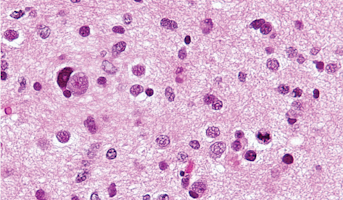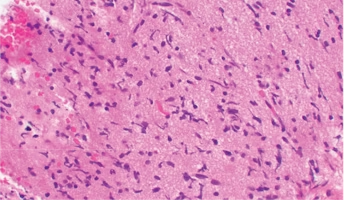Regional Response to ONC201 in Pediatric High-Grade Glioma
Email Principal Investigator

Carl Koschmann
CBTN Specimen
CBTN Participants
CBTN Pre-clinical Models
Backer
Internal funding
About this
Project
Pediatric high-grade glioma with H3K27M mutation (H3K27M-pHGG) carries a particularly poor prognosis and new targeted therapies are needed to address this disease. Case report data has shown that ONC20, a dopamine receptor (DRD2) antagonist, is effective against H3K27M-pHGGs. This means that ONC20 binds to the DRD2 receptor, thereby blocking the effects of any other molecules that would otherwise bind. Researchers have conducted an ongoing integrated clinical analysis of adult and pediatric patients treated in multiple early phase clinical trials to assess the regional response to treatment with ONC201 in H3K27M-pHGG. An exciting result of this ongoing analysis shows that patients with thalamic-H3K27M-HGG demonstrated an exceptional response to ONC201. The current estimates for progression free survival and overall survival are better than any previously seen. In this project, the goal will be to study the mechanism of regional response to ONC201 in pre-clinical models of H3K27M-pHGG. The Children’s Brain Tumor Network will provide researchers with pHGG cell lines that have annotated molecular and regional information. This integrative experimental approach will establish the mechanism behind the H3K27M-pHGG development and open new windows for therapies targeted to this hard to treat tumor.
Ask The
Scientists
What are the goals of this project?
Researchers aim to study the mechanism of regional response to ONC201 in pre-clinical models of H3K27M-pHGG.
What is the impact of this project?
Once the mechanisms for regional response to ONC201 are more clearly understood, therapies utilizing these discoveries can be developed.
Why is the CBTN request important to this project?
The Children’s Brain Tumor Network will provide researchers with pHGG samples matched with relevant data, increasing the efficiency of this work.
Specimen Data
The Children's Brain Tumor Network is contributing to this project by providing cell lines.
related
Histologies

High-Grade Glioma
High-grade Gliomas (HGG) or astrocytomas in children nearly always result in a dismal prognosis. Although novel therapeutic approaches are currently in development, preclinical testing has been limited, due to a lack of pediatric-specific HGG preclinical models. These models are needed to help test

Diffuse Intrinsic Pontine Glioma
A presumptive diagnosis of DIPG based on classic imaging features, in the absence of a histologic diagnosis, has been routinely employed. Increasingly however, histologic confirmation is obtained for both entry into research studies and molecular characterization of the tumor.[5] New approaches with

